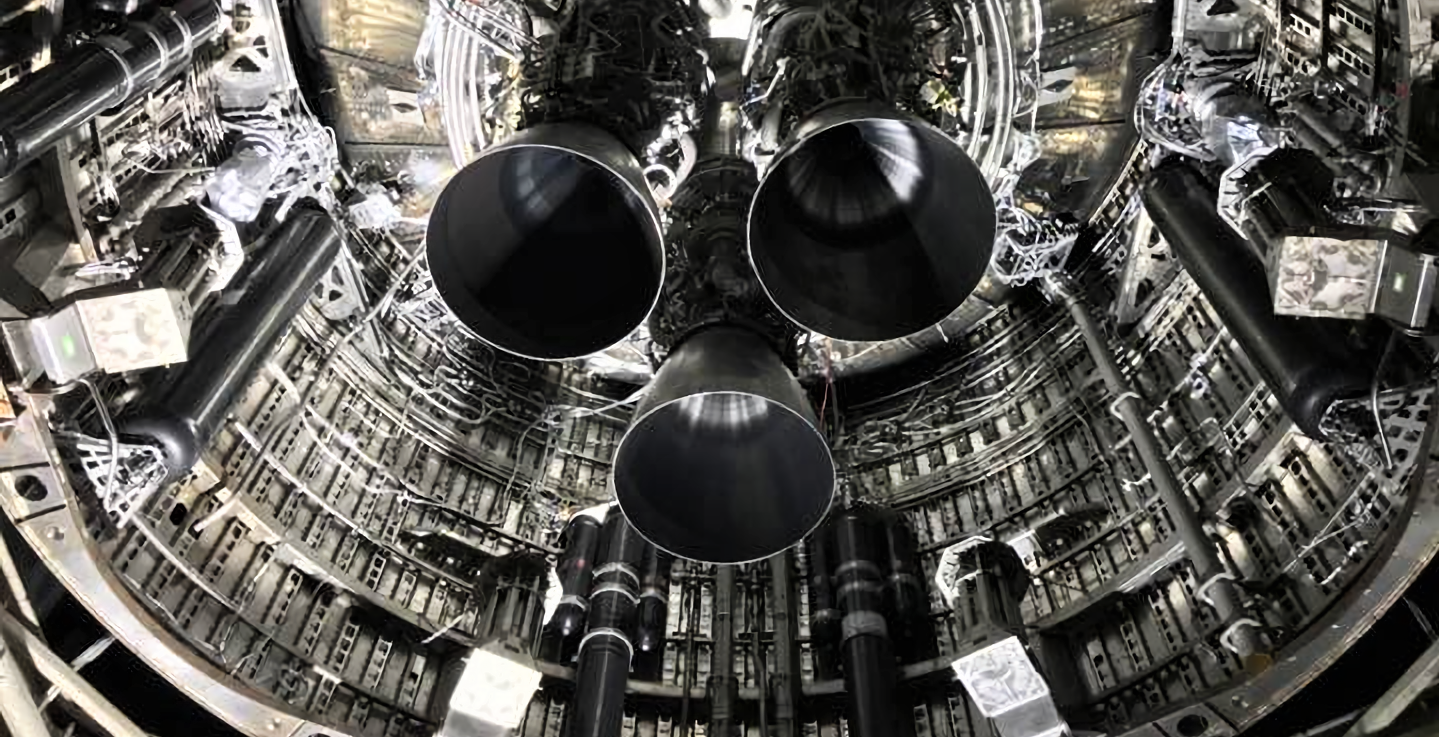
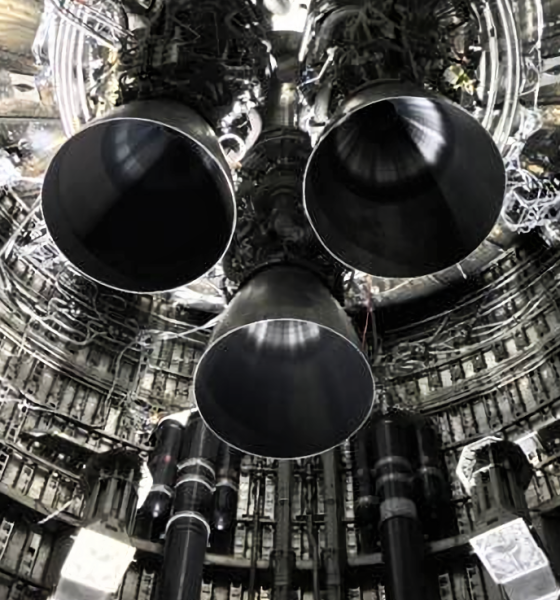
News
SpaceX schedules Starship’s first triple-Raptor static fire test
A photo posted by CEO Elon Musk confirms that SpaceX has successfully installed three functional Raptors on Starship SN8 just hours before road closure notices revealed the company’s first triple-engine static fire schedule.
Technically, it’s incorrect to say that Starship serial number 8 (SN8) is the first prototype to receive three Raptor engines. Back in late-September 2019, in the lead-up to Musk’s promised Starship update event, the company installed three Raptors on the first full-scale prototype, known as Starship Mk1. The engines were only installed as an apparent fit test or even a photo opportunity, however – evidenced by the fact that they weren’t actually plumbed to the Starship’s propellant tanks.
Even then, in September 2019, Starship Mk1 was far from ready to make use of Raptor engines and was more than a month away from attempting its first pressure and cryogenic proof tests – tests it quickly failed. As such, Starship SN8 – having more or less successfully passed its ‘cryo proof’ by October 9th – is undoubtedly the first ship to have a shot at igniting multiple Raptor engines at once.
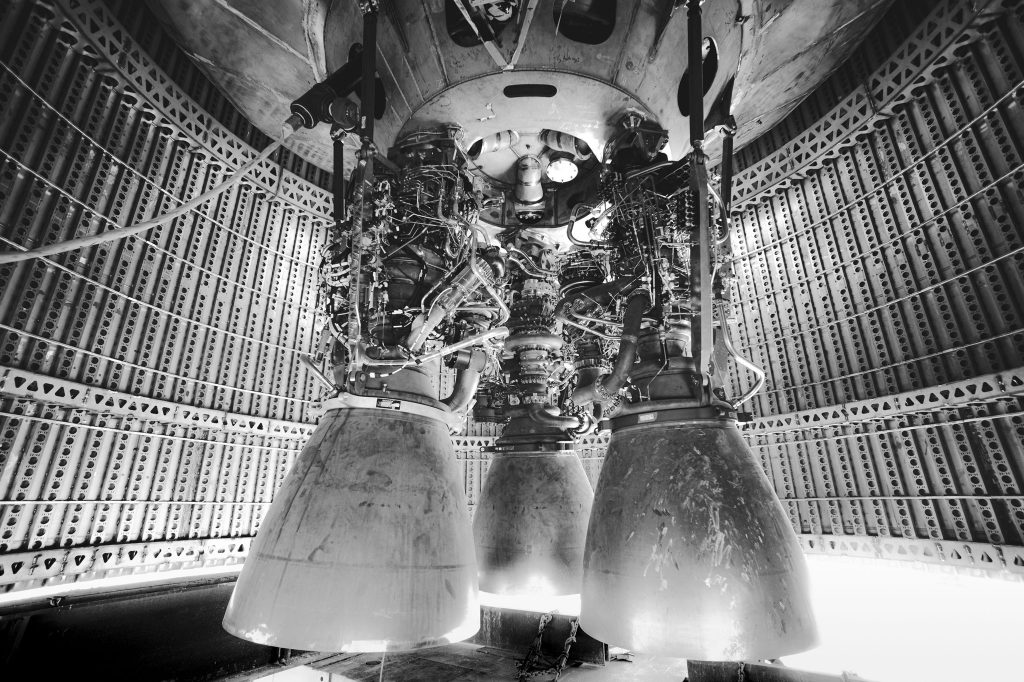
Curiously, SpaceX remained quiet for several days after Starship SN8 passed its first big test. Whereas with past Starship prototypes SpaceX has often filed test plans (appearing in the form of road closures) even before the current phase of testing is complete, the company waited until Tuesday, October 14th to file closure notices for “SN8 static fire” testing.
Same as Starships SN4, SN5, and SN6, all of which successfully graduated from cryo proof to static fire testing (and even flight tests for the latter two), SpaceX began Starship SN8’s test campaign with a cryo proof. It took three days and at least as many attempts but SN8 ultimately “passed cryo proof” according to Elon Musk, likely meaning that the ship reached sustained pressures of 7.5 bar (~110 psi) or more.
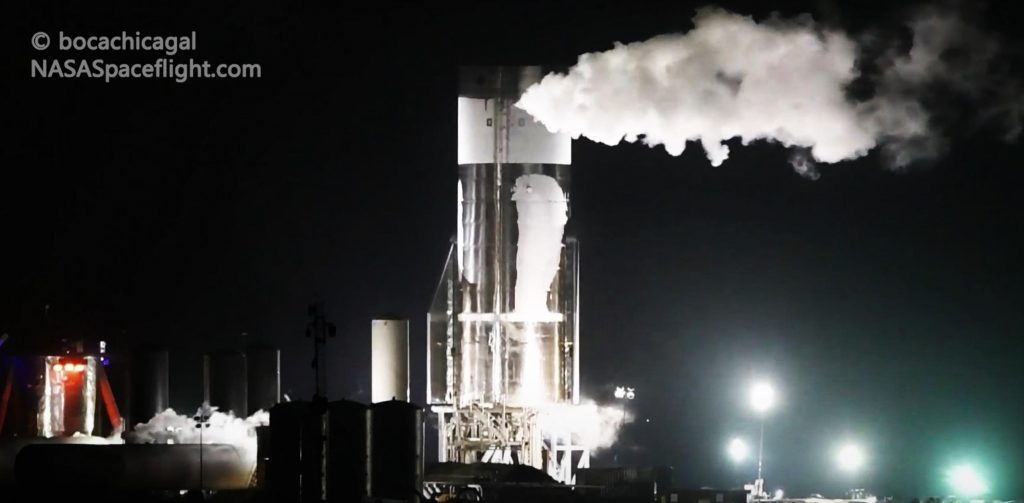
Cryo proof complete, SpaceX installed Starship SN8’s engines – the first time multiple Raptors have been fully integrated with a rocket or test stand – in preparation for another Raptor first: multi-engine static fires. While modern computation fluid dynamics (CFD) and modeling mean that the great unknowns of rocket propulsion are rarely as opaque as they used to be, the first test of multiple powerful engines in close proximity is still a guaranteed recipe for surprises.
Thanks to expertise hard-won from nearly 100 Falcon 9 and Falcon Heavy launches, SpaceX is likely the world’s foremost expert in the challenges and dynamics of the proximity operation of more than two rocket engines. At the same time, though, Raptor is a dramatically different engine than Merlin 1D and while Starship will only have six engines at most, those six engines will produce thrust equivalent to almost two entire Falcon 9 boosters.
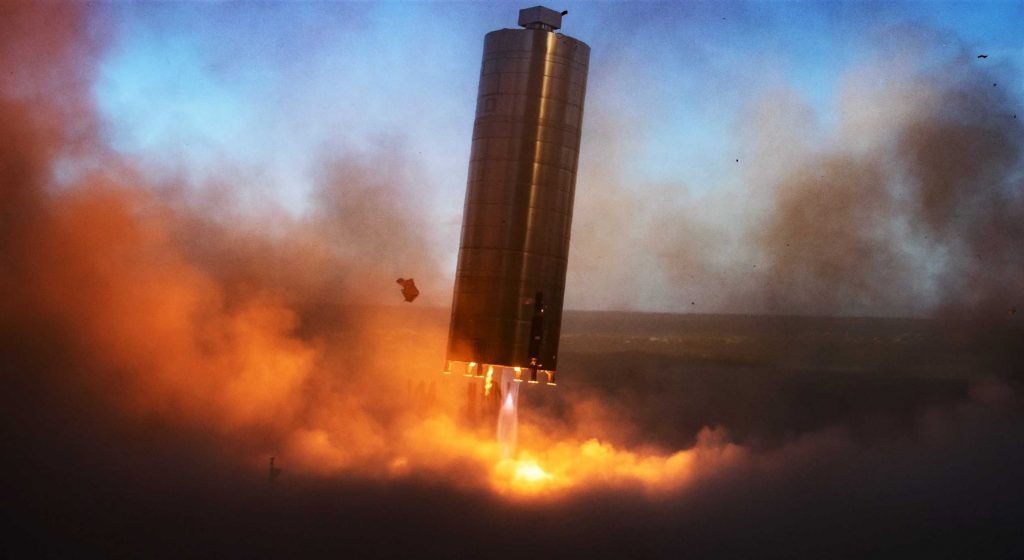
In other words, even with a (relatively) simple three-Raptor static fire, SpaceX will be treading new ground and will almost certainly end up learning one or several things about Raptor’s design and operation. More likely than not, SpaceX will begin Starship SN8’s static fire test campaign with a wet dress rehearsal (like a cryo proof but with real liquid methane and oxygen propellant) and transition into a Raptor spin prime (turbopump spin-up) or preburner test (a turbopump spin-up but with partial combustion) if the WDR goes smoothly. If all three Raptor engines appear healthy, SpaceX may recycle and attempt the first static fire just an hour or two later.
Starship SN8’s triple-Raptor static fire test window opened at 9pm CDT on October 14th and closes at 6am on the 15th, with an identical 9pm-6am backup on the 15th and another window from 8am to 4:30pm on the 16th. LabPadre (below) will continue to offer 24/7 views of Starship, including any static fire testing, while NASASpaceflight.com will likely provide live coverage once testing begins in earnest.

Cybertruck
Tesla confirms date when new Cybertruck trim will go up in price
Tesla has officially revealed that this price will only be available until February 28, as the company has placed a banner atop the Design Configurator on its website reflecting this.
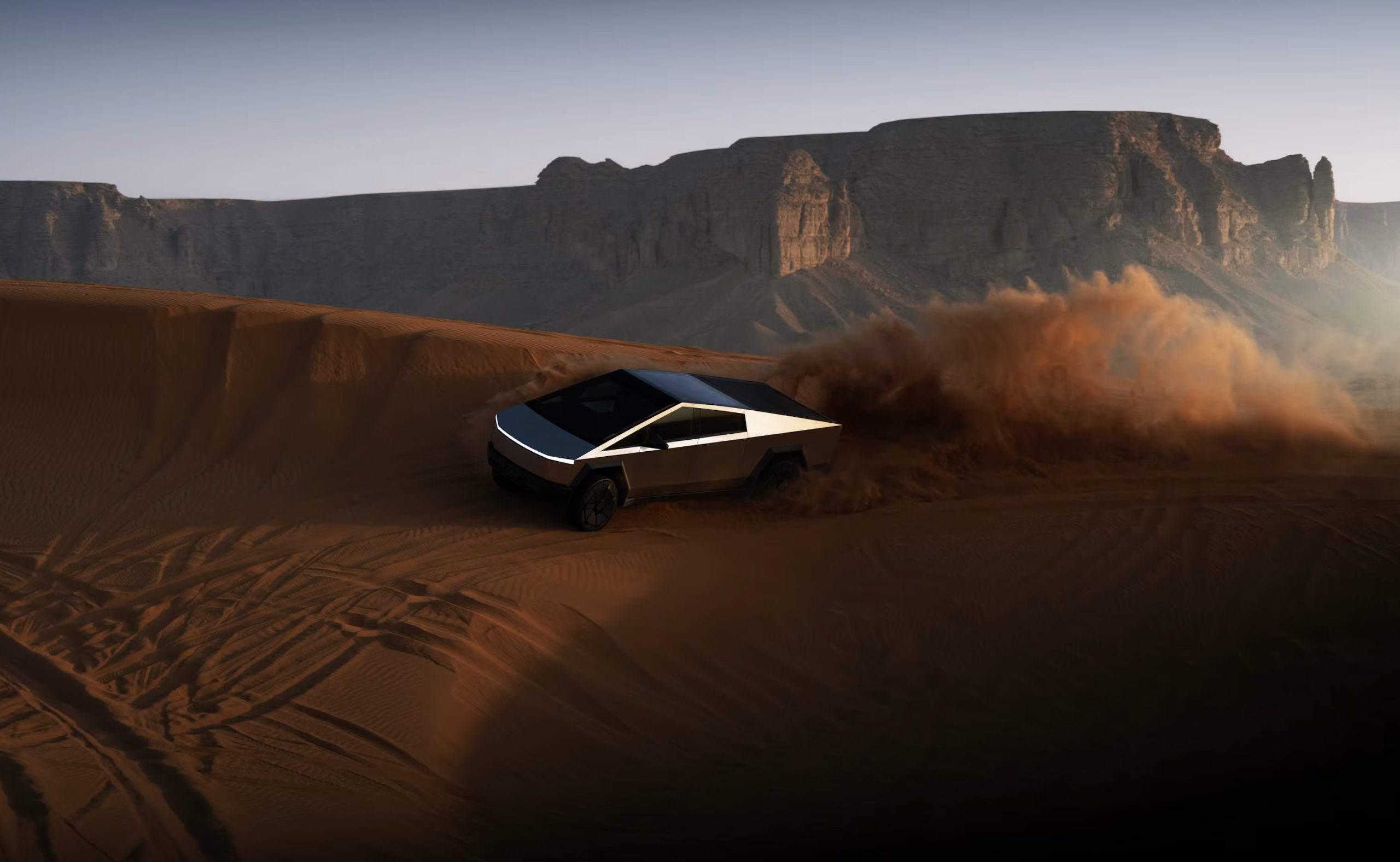
Tesla has confirmed the date when its newest Cybertruck trim level will increase in price, after CEO Elon Musk noted that the All-Wheel-Drive configuration of the all-electric pickup would only be priced at its near-bargain level for ten days.
Last week, Tesla launched the All-Wheel-Drive configuration of the Cybertruck. Priced at $59,990, the Cybertruck featured many excellent features and has seemingly brought some demand to the pickup, which has been underwhelming in terms of sales figures over the past couple of years.
Tesla launches new Cybertruck trim with more features than ever for a low price
When Tesla launched it, many fans and current owners mulled the possibility of ordering it. However, Musk came out and said just hours after launching the pickup that Tesla would only keep it at the $59,990 price level for ten days.
What it would be priced at subsequently was totally dependent on how much demand Tesla felt for the new trim level, which is labeled as a “Dual Motor All-Wheel-Drive” configuration.
Tesla has officially revealed that this price will only be available until February 28, as the company has placed a banner atop the Design Configurator on its website reflecting this:
NEWS: Tesla has officially announced that the price of the new Cybertruck Dual-Motor AWD will be increasing after February 28th. pic.twitter.com/vZpA521ZwC
— Sawyer Merritt (@SawyerMerritt) February 24, 2026
Many fans and owners have criticized Tesla’s decision to unveil a trim this way, and then price it at something, only to change that price a few days later based on how well it sells.
Awful way to treat customers – particularly when they already sent out a marketing email announcing the $59,990 truck…with zero mention of it being a limited-time offer.
— Ryan McCaffrey (@DMC_Ryan) February 24, 2026
It seems the most ideal increase in price would be somewhere between $5,000 and $10,000, but it truly depends on how many orders Tesla sees for this new trim level. The next step up in configuration is the Premium All-Wheel-Drive, which is priced at $79,990.
The difference between the Dual Motor AWD Cybertruck and the Premium AWD configuration comes down to towing, interior quality, and general features. The base package is only capable of towing up to 7,500 pounds, while the Premium can handle 11,000 pounds. Additionally, the seats in the Premium build are Vegan Leather, while the base trim gets the textile seats.
It also has only 7 speakers compared to the 15 that the Premium trim has. Additionally, the base model does not have an adjustable ride height, although it does have a coil spring with an adaptive damping suspension package.
Cybertruck
Tesla set to activate long-awaited Cybertruck feature
Tesla will officially activate the Active Noise Cancellation (ANC) feature on Cybertruck soon, as the company has officially added the feature to its list of features by trim on its website.
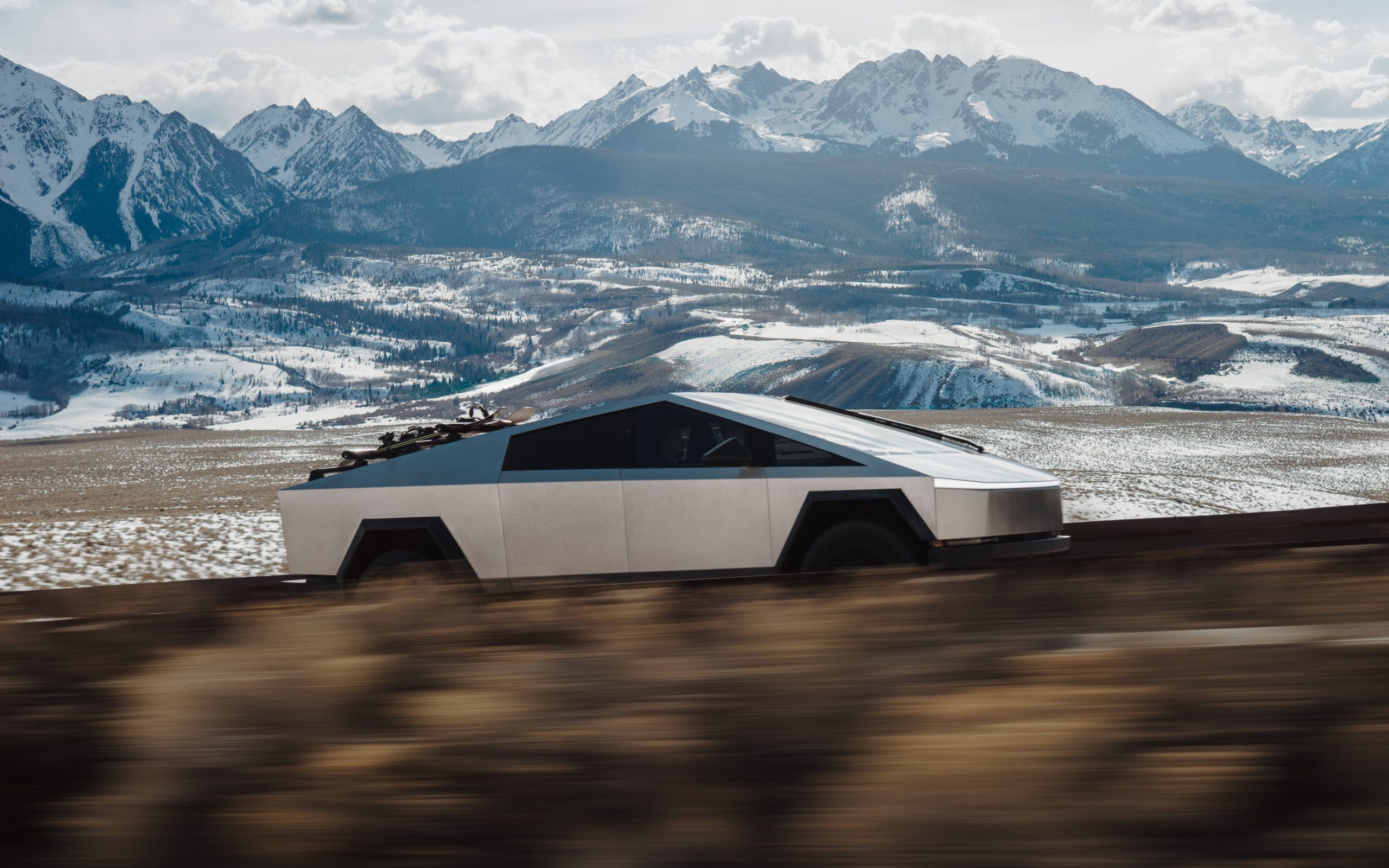
Tesla is set to activate a long-awaited Cybertruck feature, and no matter when you bought your all-electric pickup, it has the hardware capable of achieving what it is designed to do.
Tesla simply has to flip the switch, and it plans to do so in the near future.
Tesla will officially activate the Active Noise Cancellation (ANC) feature on Cybertruck soon, according to Not a Tesla App, as the company has officially added the feature to its list of features by trim on its website.
Tesla rolls out Active Road Noise Reduction for new Model S and Model X
The ANC feature suddenly appeared on the spec sheet for the Premium All-Wheel-Drive and Cyberbeast trims, which are the two configurations that have been delivered since November 2023.
However, those trims have both had the ANC disabled, and although they are found in the Model S and Model X, and are active in those vehicles, Tesla is planning to activate them.
In Tesla’s Service Toolbox, it wrote:
“ANC software is not enabled on Cybertruck even though the hardware is installed.”
Tesla has utilized an ANC system in the Model S and Model X since 2021. The system uses microphones embedded in the front seat headrests to detect low-frequency road noise entering the cabin. It then generates anti-noise through phase-inverted sound waves to cancel out or reduce that noise, creating quieter zones, particularly around the vehicle’s front occupants.
The Model S and Model X utilize six microphones to achieve this noise cancellation, while the Cybertruck has just four.
Tesla Cybertruck Dual Motor AWD estimated delivery slips to early fall 2026
As previously mentioned, this will be activated through a software update, as the hardware is already available within Cybertruck and can simply be activated at Tesla’s leisure.
The delays in activating the system are likely due to Tesla Cybertruck’s unique design, which is unlike anything before. In the Model S and Model X, Tesla did not have to do too much, but the Cybertruck has heavier all-terrain tires and potentially issues from the aluminum castings that make up the vehicle’s chassis, which are probably presenting some challenges.
Unfortunately, this feature will not be available on the new Dual Motor All-Wheel-Drive configuration, which was released last week.
News
Tesla Model S and X customization options begin to thin as their closure nears
Tesla’s Online Design Studio for both vehicles now shows the first color option to be listed as “Sold Out,” as Lunar Silver is officially no longer available for the Model S or Model X. This color is exclusive to these cars and not available on the Model S or Model X.
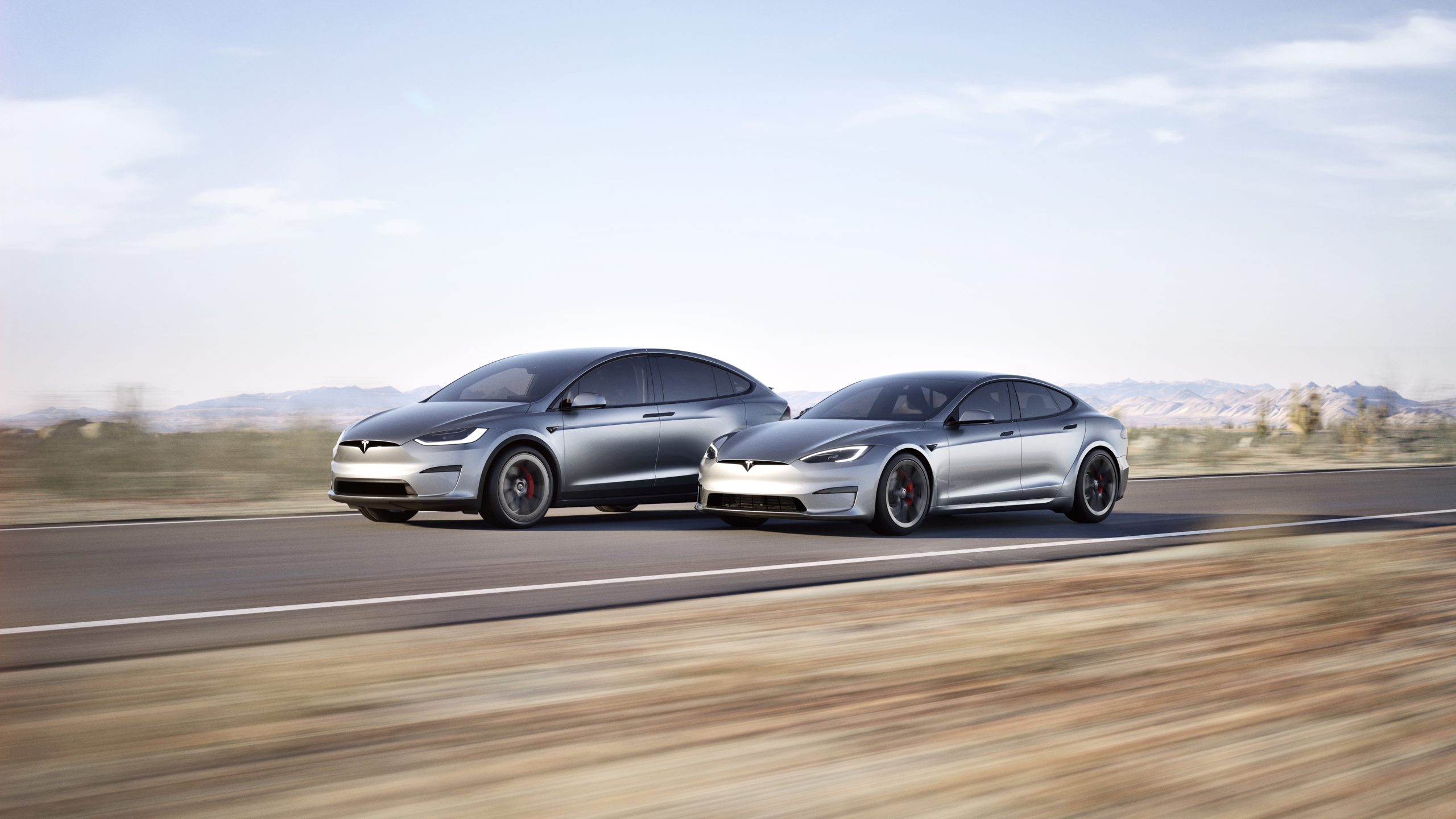
Tesla Model S and Model X customization options are beginning to thin for the first time as the closure of the two “sentimental” vehicles nears.
We are officially seeing the first options disappear as Tesla begins to work toward ending production of the two cars and the options that are available to those vehicles specifically.
Tesla’s Online Design Studio for both vehicles now shows the first color option to be listed as “Sold Out,” as Lunar Silver is officially no longer available for the Model S or Model X. This color is exclusive to these cars and not available on the Model S or Model X.
🚨 Tesla Model S and Model X availability is thinning, as Tesla has officially shown that the Lunar Silver color option on both vehicles is officially sold out
To be fair, Frost Blue is still available so no need to freak out pic.twitter.com/YnwsDbsFOv
— TESLARATI (@Teslarati) February 25, 2026
Tesla is making way for the Optimus humanoid robot project at the Fremont Factory, where the Model S and Model X are produced. The two cars are low-volume models and do not contribute more than a few percent to Tesla’s yearly delivery figures.
With CEO Elon Musk confirming that the Model S and Model X would officially be phased out at the end of the quarter, some of the options are being thinned out.
This is an expected move considering Tesla’s plans for the two vehicles, as it will make for an easier process of transitioning that portion of the Fremont plant to cater to Optimus manufacturing. Additionally, this is likely one of the least popular colors, and Tesla is choosing to only keep around what it is seeing routine demand for.
During the Q4 Earnings Call in January, Musk confirmed the end of the Model S and Model X:
“It is time to bring the Model S and Model X programs to an end with an honorable discharge. It is time to bring the S/X programs to an end. It’s part of our overall shift to an autonomous future.”
Fremont will now build one million Optimus units per year as production is ramped.








